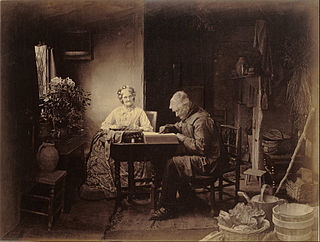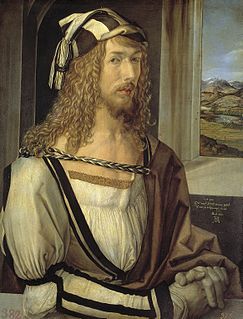A Quote by Henry Peach Robinson
A work of art is a work of order, and if the artist is to put the stamp of his own mind on his work, he must arrange, modify, and dispose of his materials so that they may appear in a more agreeable and beautiful manner than they would have assumed without his interference.
Related Quotes
The artist seeks contact with his intuitive sense of the gods, but in order to create his work, he cannot stay in this seductive and incorporeal realm. He must return to the material world in order to do his work. It's the artist's responsibility to balance mystical communication and the labor of creation.
Clearly the hardest thing for the working artist is to create his own conception and follow it, unafraid of the strictures it imposes, however rigid these may be... I see it as the clearest evidence of genius when an artist follows his conception, his idea, his principle, so unswervingly that he has this truth of his constantly in his control, never letting go of it even for the sake of his own enjoyment of his work.
The master in the art of living makes little distinction between his work and his play, his labor and his leisure, his mind and his body, his information and his recreation, his love and his religion. He hardly knows which is which. He simply pursues his vision of excellence at whatever he does, leaving others to decide whether he is working or playing. To him he's always doing both.
Socialism is the doctrine that man has no right to exist for his own sake, that his life and his work do not belong to him, but belong to society, that the only justification of his existence is his service to society, and that society may dispose of him in any way it pleases for the sake of whatever it deems to be its own tribal, collective good.
It is only in his work that an artist can find reality and satisfaction, for the actual world is less intense than the world of his invention and consequently his life, without recourse to violent disorder, does not seem very substantial. The right condition for him is that in which his work in not only convenient but unavoidable.
An artist of understanding and experience can show more of his great power and art in small things roughly and rudely done, than many another in a great work. A man may often draw something with his pen on a half sheet of paper in one day . . . . and it shall be fuller of art and better than another's great work whereon he hath spent a whole year's careful labor.
A willing, cheerful worker, with his heart in his job, will turn out more work and more satisfactory work in 44 hours than an unwilling worker, dissatisfied with his conditions, will turn out in 54 hours. It is good business, therefore, for every employer to go as far as he possibly can in reaching a schedule agreeable to his people.
The dismal half-baked images of the average "reportage" and "documentary" photography are self dammning... the slick manner, the slightly obscure significance, the esoteric fear of simple beauty for its own sake - I am deeply concerned with these manifestations of decay. Gene Smith's work validates my most vigorous convictions that if the documentary photographs is to be truly effective it must contain elements of art, intensity, fine craft and spirituality. All these his work contains and we may turn to his work with gratitude, appreciation and great respect.
The young man who addresses himself in stern earnest to organizing his life-his habits, his associations, his reading, his study, his work-stands far more chance of rising to a position affording him opportunity to exercise his organizing abilities than the fellow who dawdles along without chart or compass, without plan or purpose, without self-improvement and self-discipline.


































